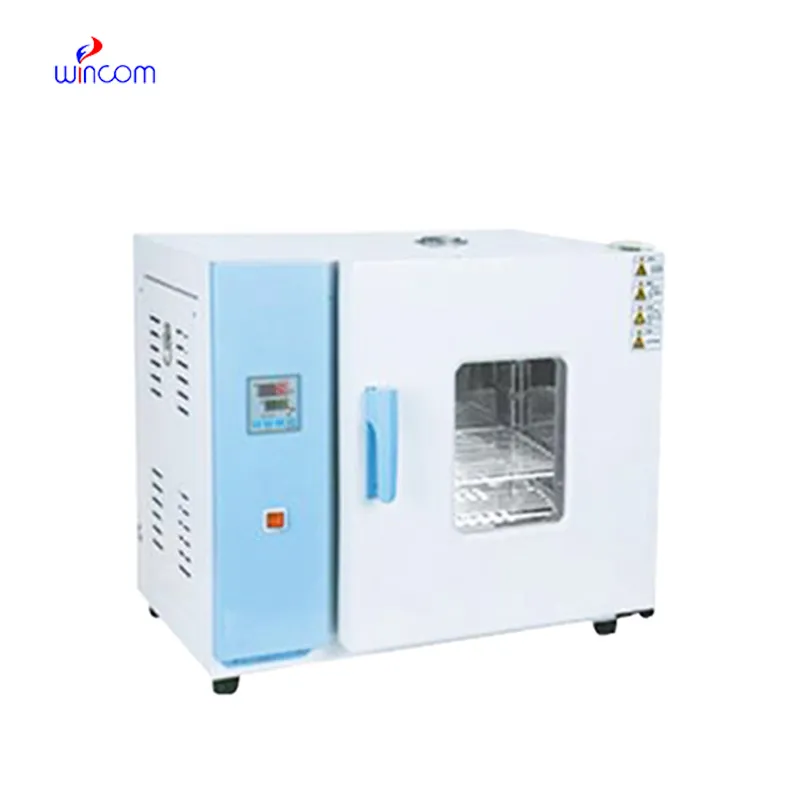In laboratory equipment, both drying ovens and incubators are indispensable tools, yet they serve distinct purposes depending on the application. Whether you’re a researcher, manufacturer, or laboratory technician, understanding the difference between these two devices can help you make an informed decision about which one best fits your needs.
Drying oven is a specialized laboratory device designed for heating, drying, and curing materials. Its primary function is to remove moisture from samples or substances by exposing them to a controlled heat source. Drying ovens are commonly used in applications where precise, uniform drying is required to ensure the consistency of samples. They are particularly useful for drying powders, liquids, and other materials that need to be completely moisture-free.
Typically, the drying oven can be operated in the range of RT+5-250℃, with some high-temperature models reaching even higher limits. It can be used to dry samples to specific levels of moisture content, which is crucial in industries like pharmaceuticals, food processing, and material testing. What’s more, the drying oven often use forced convection to ensure even heat distribution throughout the chamber. This promotes uniform drying and eliminates hot or cold spots.
An incubator, on the other hand, is a laboratory device used to maintain a stable, controlled environment for the growth and development of biological cultures, cells, or tissues. Incubators are designed to provide precise temperature, humidity, and sometimes CO2 control to promote the optimal growth conditions for biological specimens.
Incubators generally offer a narrow temperature range, usually from 20°C to 60°C (68°F to 140°F), depending on the type of biological process being supported. Many incubators come equipped with humidity controls to maintain moisture levels in the chamber. Even some incubators are equipped with CO2 regulation, providing a specific gas mixture to maintain proper pH levels for cell cultures. Unlike drying ovens, incubators provide gentle, even airflow to avoid disturbing sensitive cultures.
To gain a clearer and more intuitive understanding of the differences between drying ovens and incubators, let’s take a closer look at the key differences in the table below.
| Feature | Drying Oven | Incubator |
| Primary Function | Moisture removal and material drying | Culturing cells, bacteria, or tissues |
| Temperature Range | High temperatures (Nearly 300°C) | Moderate temperatures (20°C to 60°C) |
| Airflow | Forced convection for uniform drying | Gentle, non-disruptive airflow |
| Humidity Control | Typically no humidity control | Humidity control is often included |
| Applications | Material drying, curing, testing | Biological culture growth, tissue culture, microbial growth |
| Environmental Control | Limited control of temperature only | Control over temperature, humidity, and sometimes CO2 levels |
The choice between a drying oven and an incubator depends entirely on your specific application. Drying ovens are your go-to choice if your primary goal is to remove moisture from a material or sample. Industries that require precise drying for materials such as chemicals, pharmaceuticals, food products, and textiles benefit greatly from drying ovens. They are also ideal when you need to cure substances like resins or coatings, or when performing material testing that requires consistent drying conditions. Some specific scenarios where a drying oven would be appropriate include: pharmaceuticals, food processing, research and testing.
If your laboratory work involves biological growth—whether it’s cell cultures, bacterial cultures, or microbial samples—an incubator is the clear choice. Incubators provide the specific environmental conditions needed for optimal growth, including stable temperature, humidity, and, in some models, CO2 regulation.
By understanding the differences and specific uses for each, you can make a more informed decision on which equipment will best support your laborator’s needs.

At Wincom, we take pride in offering premium-quality, dependable drying ovens that are engineered to meet the highest standards. Our products are designed to provide consistent, efficient, and precise performance for your laboratory needs. Whether you’re focused on material drying, curing, or testing, our drying ovens deliver exceptional results every time. Reach out to us today to discover how our innovative solutions can elevate your laboratory’s efficiency and support your success in achieving reliable, high-performance outcomes.
